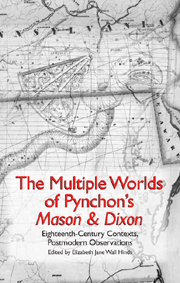 The Multiple Worlds of Pynchon's 'Mason and Dixon'
The Multiple Worlds of Pynchon's 'Mason and Dixon' Book contents
- Frontmatter
- Contents
- Preface
- Note on Quotations from Mason & Dixon
- The Rounds of History
- Consumption Then and Now
- 2 The Sweetness of Immorality: Mason & Dixon and the American Sins of Consumption
- 3 Consumption on the Frontier: Food and Sacrament in Mason & Dixon
- Space and Power
- Enlightenment Microhistories
- Works Cited
- Notes on the Contributors
- Index
2 - The Sweetness of Immorality: Mason & Dixon and the American Sins of Consumption
from Consumption Then and Now
Published online by Cambridge University Press: 12 September 2012
- Frontmatter
- Contents
- Preface
- Note on Quotations from Mason & Dixon
- The Rounds of History
- Consumption Then and Now
- 2 The Sweetness of Immorality: Mason & Dixon and the American Sins of Consumption
- 3 Consumption on the Frontier: Food and Sacrament in Mason & Dixon
- Space and Power
- Enlightenment Microhistories
- Works Cited
- Notes on the Contributors
- Index
Summary
NOWHERE IS THE COMPLEX NARRATIVE engagement with the position of the modern ethical subject in relation to the global commodity culture more profoundly drawn than in the works of Thomas Pynchon, and Mason & Dixon in particular stands as a narrative summa of his career-long interest in the historical dimensions of that position. This is not because the novel is more immediately concerned with the operations of a social ethic within the narrow dimensions of its plot and narrative (in fact, it is probably less concerned with such operations on that level than Gravity's Rainbow or Vineland), but because the problems of Pynchon's lifelong interest in the place of the radical, the humanitarian, the outsider, is here forced to contend with an emergent global market that will provide the fundamental base from which a wide array of colonial endeavors will be launched: the expansion of international trade, the entrenchment of chattel slavery as its privileged mode of production, and the often paradoxical relations of such a system to Enlightenment notions of reason, dignity, and freedom. It is with a sensibility grounded more in the appraisal of dramatic and literary conventions than in the demands of a historically meaningful social activism that many critics have approached the issue of how Pynchon seems to confront despicable historical institutions like slavery; the present analysis, then, endeavors to serve as a preliminary corrective to our critical tendency to sentimentalize Pynchon while glossing over his more deeply embedded conceptions of what constitutes moral sensibility, meaningful action, and agency in general in Mason and Dixon's era of expanding capital and our own.
- Type
- Chapter
- Information
- The Multiple Worlds of Pynchon's 'Mason and Dixon'Eighteenth-Century Contexts, Postmodern Observations, pp. 49 - 76Publisher: Boydell & BrewerPrint publication year: 2005


